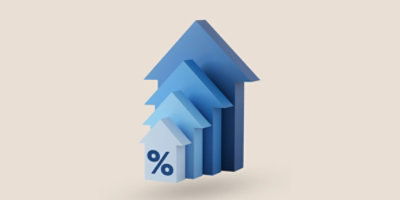-
Personal Banking -
Insights
4 Smart Investment Strategies for Home Equity Line of Credit
Your home is more than a roof over your head: Your residence is one of your most valuable assets. Tapping into the equity in your home can be a smart way to strengthen your financial position and give you quick access to funds.
One of the most popular ways to leverage the value of your property is via a home equity line of credit, also known as a HELOC.
It's an especially good time to consider such a loan given the present economic climate.
“Historically low interest rates, and increasing property values in most of the communities we serve, has led to an increase in using the equity in personal residences (via mortgage refinancing and home equity financing) to finance a variety of things like home renovations or consolidating high-interest-rate personal debt," said Jason Mock, regional field sales manager at City National Bank.
Best Ways to Use a HELOC
HELOCs work similarly to how credit cards work. Your HELOC provider will set a credit limit, which usually is based on how much equity you have in your home. You can then spend as little or as much as you'd like, as long as you stay under that limit. When you pay off a part of the loan, your credit increases by the amount you paid.
In many cases, the interest on a HELOC is less than interest on a credit card or other types of loans, making it an attractive option for financing new ventures or consolidating debt.
Unexpected Occurrences
Even the most organized and financially responsible person can't plan for every unexpected event, natural disaster or emergency. A serious medical condition, a death in the family or an economic downturn can result in a sudden need for funds. “Affluent or not, unexpected expenses associated with life events can happen to anyone at any time," said Antonio Barreras, regional field sales manager at City National Bank. “A HELOC can provide a worthwhile peace-of-mind factor to mitigate these unexpected issues."
Even if an individual has investments or savings they can draw on to handle an unexpected expense, a home equity line of credit can still be a wise choice. “Our clients typically have accumulated a large level of personal savings, so when unexpected emergencies occur, they generally have enough savings to cover these expenses. However, they may prefer to finance the expenses rather than use their savings," said Mock.
“For example, market fluctuations occur and there are times where it would be problematic to liquidate a portfolio in a down market. Furthermore, depending on market situations, obtaining temporary financing in the future may be less advantageous due to higher rates, higher costs or a real estate downturn," he explained.
Life Events
Of course, sometimes important events are foreseeable but nonetheless require large outlays of funds. For things like major home renovations, private school fees and college tuition, a HELOC can provide a predictable, long-term source of reliable financing. “A home equity line of credit can have fixed rate options that are ideal for individuals seeking fixed-term financing for items like a vehicle, tuition or debt consolidation," said Barreras. “Fixed terms are available from 3 to 15 years and provide a fully amortizing structure without any prepayment costs."
Mock noted that the advantages HELOCs offer over other loans are primarily centered on low rates (which are often substantially lower than unsecured options), flexible payments (as low as interest-only) and long-term financing options (can be minimum 10 years) in many cases.
Some people may use a HELOC to finance a startup business that could lead to future self-employment and increase their net worth. "Most small business loans carry higher interest rates, amortizing payments and shorter terms, typically five to 10 years. While this accelerated payment schedule helps to build equity quicker, cash flow is strained," said Mock.
Real Estate Purchases
A home equity line of credit can be a quick way to access a long-term source of capital when buying a home or an investment property. There are two main ways a HELOC can be used when buying real estate: as a down payment or as bridge financing.
“Our clients have used HELOCs for the down payment of their future primary residence, a second home or a real estate investment," said Mock.
For example, a property purchase of $1 million could be financed by a new first mortgage of $800,000 on the property being purchased, along with a $200,000 HELOC advance from a current residence for the down payment. In that case, the $200,000 would be a balance paid over time. Parents who own property may use this strategy to help their children purchase a home by providing the down payment.
Both Barreras and Mock also highlight the ways a HELOC can be used as short-term bridge financing for a property purchase. It can be used to bridge a gap between the purchase price of a new home when your current home hasn't sold before escrow closes on the new home.
It can also be used by real estate investors who want to take advantage of purchasing a new property with cash.
“People can use a home equity line as temporary financing to purchase real estate when there are advantages to cash purchase offers, and then obtain permanent financing for the real estate after the close of escrow," said Mock. In this way, a HELOC makes investing in one or more investment properties more attainable then having to save up down payments for each.
Replace a First Mortgage
Home owners who have built up equity in their primary residences but still have a mortgage may want to use a HELOC to reduce their mortgage and interest payments or pay off the mortgage completely. Home equity lines of credit are potentially more desirable than mortgages because they may offer lower interest rates and often have more flexible repayment options.
“While the tax law changes have limited the tax deductibility of HELOCs and mortgages for non-home related purposes, because of the secured nature of the home equity line it still provides the lowest rate possible for a revolving line of credit," said Mock. He noted it's essential that clients speak to a licensed tax expert when considering a HELOC for tax purposes.
No matter what your current net worth is, a home equity line of credit can be a powerful financial tool — when used effectively. Talk with your financial advisor or banker about how you can leverage a HELOC to consolidate debt or explore new ways to grow your wealth.
This article is for general information and education only. It is provided as a courtesy to the clients and friends of City National Bank (City National). City National does not warrant that it is accurate or complete. Opinions expressed and estimates or projections given are those of the authors or persons quoted as of the date of the article with no obligation to update or notify of inaccuracy or change. This article may not be reproduced, distributed or further published by any person without the written consent of City National. Please cite source when quoting.
City National residential mortgage products are not available in all states. Ask us for more information about the states where City National lends. Loans are subject to credit review and approval, including a property appraisal obtained by and satisfactory to City National and the applicant's meeting certain ability-to-repay requirements under federal law. Other restrictions and terms apply. Not all applicants will qualify. City National, as a matter of policy, does not give tax, accounting, regulatory or legal advice. Rules in the areas of law, tax, and accounting are subject to change and open to varying interpretations.





